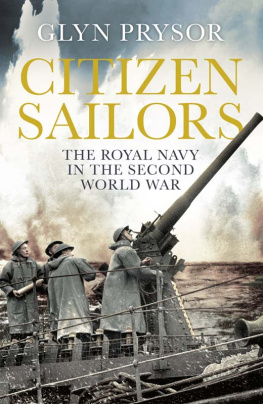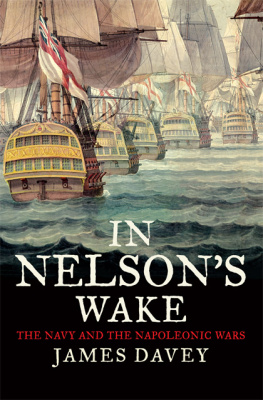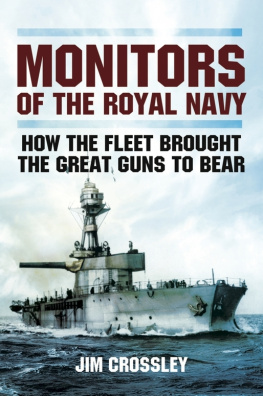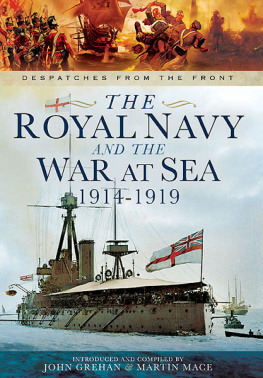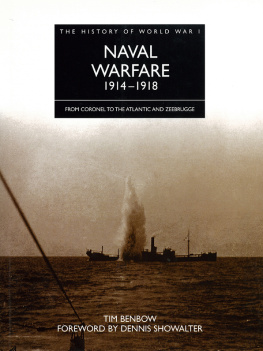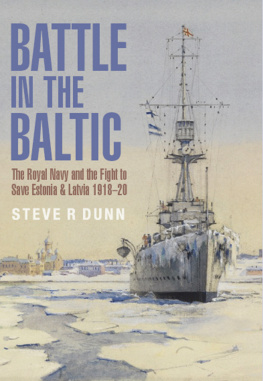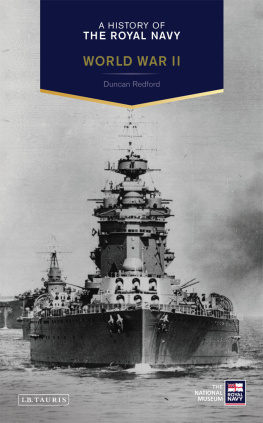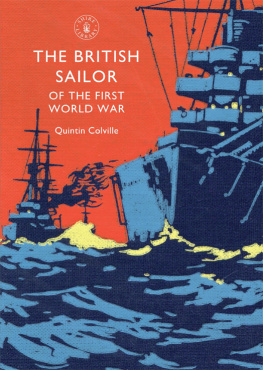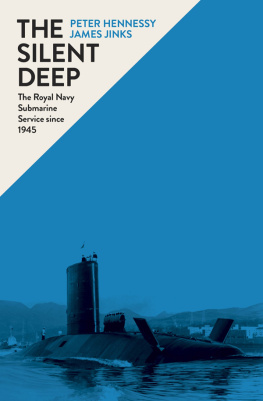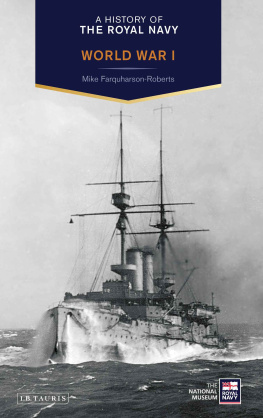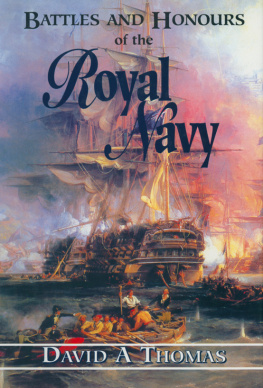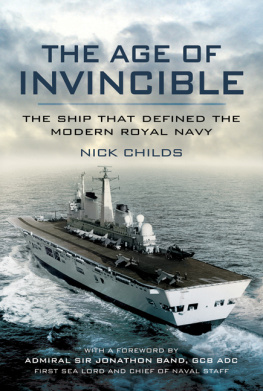Acknowledgements
My first debt is to the men and women whose diaries, letters, memoirs and recollections inspired this book. I would like to express my sincere gratitude to every veteran, relative or family friend who granted permission for personal papers to be quoted. Special thanks are due to Rear Admiral John Roberts for allowing me to make use of his Midshipmans Journal, a document written in youth which marked the start of a distinguished career.
It has been an uncommon privilege to speak with, and to receive letters from, many of the witnesses on whose words I have drawn, or to talk to their partners, children or grandchildren. Every effort has been made to reach copyright holders, but in a few cases this was not possible. Correspondence is welcomed by the author and the relevant archives in any such instance.
Many archivists and librarians helped to make my research more effective as well as more pleasurable. Chief amongst them was Roderick Suddaby of the Department of Documents at the Imperial War Museum in London, who went far beyond the call of duty in providing invaluable assistance and guidance. The staff of the Department of Documents, as well as their colleagues at the departments of Printed Books, Sound, and Photographs, were unfailingly patient and helpful. I am particularly grateful to Sabrina Rowlatt, who processed an enormous number of correspondence requests, and to Thomas Eaton, Ian Proctor and Richard Hughes.
At the National Museum of the Royal Navy in Portsmouth, Matthew Sheldon offered a great deal of helpful advice at both the start and the end of the research process, as did the staff of the museums library. At the Second World War Experience Centre, now located in Wetherby, Cathy Pugh was a welcoming and enthusiastic guide to the collections under her care, and the volunteers at the centre generously shared their workspace with me. The automated ordering system at the National Archives is a great help to researchers, but there are times when people are better than computers, and fortunately the staff at Kew were always willing to help. Thanks also to John Parton at Curtis Brown and Dan Parry at Dangerous Films, who responded swiftly to copyright requests. For access to their material, I am grateful to the Trustees of the Imperial War Museum and the London Metropolitan Archives; Mass Observation material isreproduced with the permission of Curtis Brown on behalf of the Trustees of the Mass Observation Archive.
The idea for this book emerged from research originally conducted for a D.Phil. at Oxford University. Professor Hew Strachan was a sage and supportive supervisor, and provided much-valued counsel at the outset of this project. Professor N. A. M. Rodger and Professor Jose Harris encouraged me to develop my work further. Although the final outcome takes a different form, I hope that much of the essence of the earlier material remains.
Annabel Merullo at Peters Fraser and Dunlop took a chance on a new writer, and could not have found the book a better home than Viking. Eleo Gordon has been as encouraging and judicious an editor as an author could want. Her infectious enthusiasm was always invigorating. Ben Brusey, Keith Taylor and Lesley Hodgson provided sterling assistance at crucial points. Trevor Horwood was a superb copy-editor, casting a meticulous eye over the manuscript. Douglas Matthews compiled the index with great care. It has been a pleasure to work with the entire publishing team.
For invitations to speak to exacting audiences, I am grateful to Saul Dubow, Ian Gazeley and Pierre Purseigle. For the provision of sofas and spare rooms, offices and internet connections during the process of research and writing, I owe many favours to Nick Badger and Rachael Holmes, Catherine Will and Tom Counsell, Paul Betts, Elizabeth Nolan, Michael Perks, Kathryn Ward, Jaishan Rajendra, Michael Francis and James Toop. Gerhard Wolf helped out with his camera at short notice and to good effect.
I could not wish for a more supportive family. Bob and Audrey Barron have given me another place to call home. Cleo Barron and Chris Prior always help to keep me smiling. Dewi and Meirion Prysor, my brothers, are a source of immense pride and much-needed perspective. Richard Williams and Anne Warwick, my parents, deserve greater praise than these few words can offer. They inspire me far more than they imagine.
This book is dedicated to Hester, my wife. I could not have faced the task of writing it without her. She is my anchor.
1. Introduction
In the early morning mist of 3 May 1940, the cruiser HMS Carlisle was slipping out of a Norwegian fjord. Able Seaman Charles Hutchinson manned his anti-aircraft gun, hungry and tired after a long and sleepless night. Since the previous evening, British and French ships had been rescuing 5,700 soldiers from the besieged port of Namsos. With the town now abandoned to German forces, Carlisle was part of a small convoy making a break for home. Lookouts strained their tired eyes. On the exposed upper deck, the gunners waited for the inevitable alarm.
Shortly before nine oclock, the first German bombers were spotted swooping over the mountains which lined the fjord. It was the beginning of six hours of sustained attack as the convoy made its way out to sea. Hells pandemonium started, wrote Hutchinson soon afterwards, planes attacking from all angles, and I couldnt describe it if I wanted to. No-one except those taking part could ever realise it It was like Hell let loose.
Junkers 88s dropped their payloads from high altitude while ships veered from side to side, near misses sending torrents of water into the air. Stuka dive-bombers screamed as they flew down towards their targets. Some aimed for a French troopship directly ahead of Carlisle, while Hutchinson and the other gunners put up their barrage, empty shell casings piling up on the deck beside them. It was not long before the nearby French destroyer Bison was hit and sinking rapidly. Hutchinson watched as some of her sailors managed to scramble aboard the British destroyer HMS Afridi. They enjoyed little respite: Afridi was struck later in the afternoon, capsizing and taking ninety-two souls to the bottom of the Norwegian Sea.
Safely back at the naval base of Scapa Flow, nestled at the heart of the Orkneys, the sailors could reflect on their experiences. Now, when I think of the episode I marvel at it, wrote Hutchinson in a battered notebook, how everyone on the ship and particularly on the guns stuck it without any panic during the heavy raids, as really I dont think it would have surprised anybody if some of them had panicked and run as it was a Hell of an experience. The gunners had managed to fend off the attacks on the troopships, saving thousands of lives, and had destroyed several bombers in the process. Ill never forget the sight, wrote Hutchinson of one ill-fated enemy plane. It was high in the air and it wobbled and then down it came. We watched it with a fiendish delight. We must be funny creatures in peace-time one wouldnt harm a fly, then taking adelight in seeing them crash to their doom.
Charles Hutchinson was twenty-six. From East Yorkshire, he had volunteered for the Humber Division of the Royal Naval Volunteer Reserve before the war, and had been mobilized in August 1939. He began writing his diary at the start of 1940, filling notebooks with his thoughts during idle moments in quiet corners, and even scribbling beside the gun up on deck while trying to protect the paper from the elements. This was an entirely new habit for a man with an ordinary working-class background, and the enthusiasm with which he took to it caused him some surprise. I certainly have written some of these lines in queer places and positions, he noted. I dont know whats come over me to write all this, but I should never remember it all so I thought if I wrote just what I thought each day it would be more natural.

